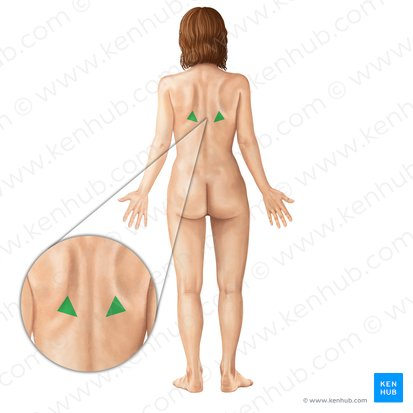back anatomy
1/77
There's no tags or description
Looks like no tags are added yet.
Name | Mastery | Learn | Test | Matching | Spaced | Call with Kai |
|---|
No analytics yet
Send a link to your students to track their progress
78 Terms
Sternocleidomastoid
Origin:
-Sternal head: manubrium of sternum
-Clavicular head: medial third of the clavicle
Insertions:
-mastoid process of the temporal bone
-superior nuchal line of the occipital bone
Innervation: Accessory nerve 11
Action: -lateral flexion/ rotation of neck and spine when acting unilaterally
-extension of neck when acting bilaterally
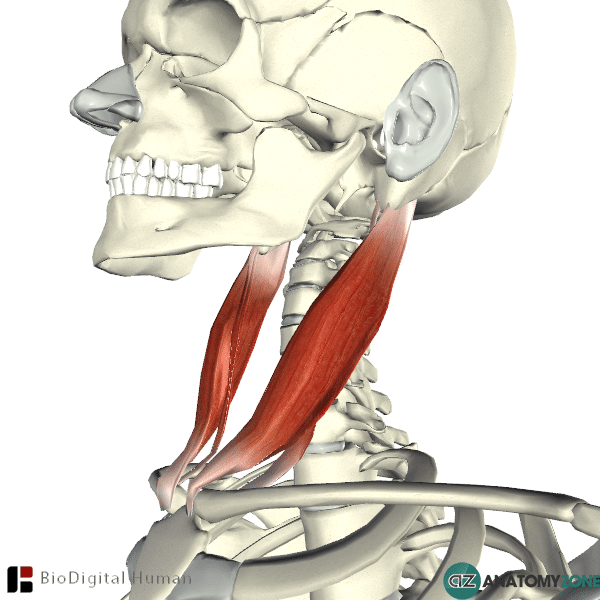
Trapezius
Origin: occipital bone, ligamentum nuchae and spinous process of vertebrae C7-T12
Insertions: lateral third of clavicle, acromion, and scapula spine
Innervation Accessory nerve 11 and cervical plexus (C3 + C4)
Action:
-upper fibers elevate scapula + rotation during abduction of arm, extension/lateral flex of neck
-middle fiber retract (abduct) scapula
- lower fiber depression + upward rotation of scapula
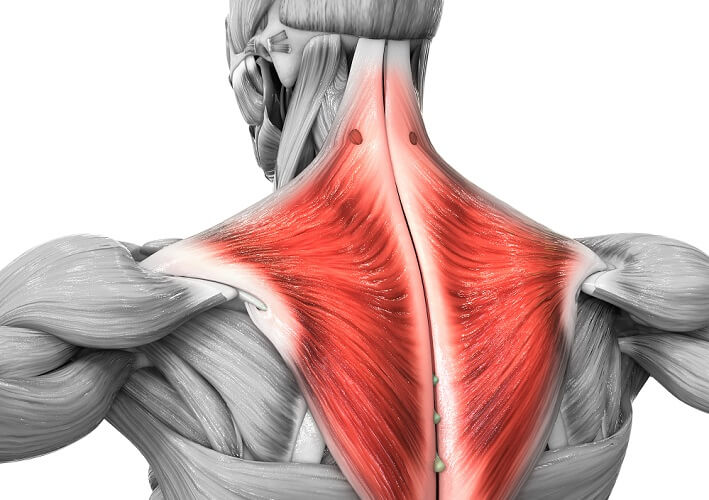
Scalene
Origin: transverse process (C2-7)
Insertions: ribs, 1 and 2
Innervation: cervical plexus, spinal nerve C3-8
Action: rib 1-2 elevation, flexion of neck and spine, ipsilateral head rotation
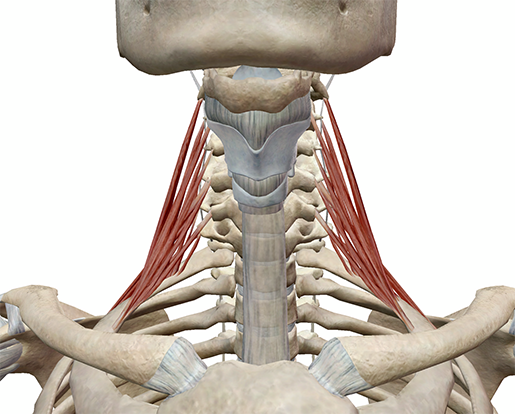
Levator scapulae
Origin: transverse process of C1-C4
Insertions: Superior part of medial border of scapula
Innervation: Dorsal scapular nerve (C5) and C3/C4
Action: elevation + downward rotation of scapula
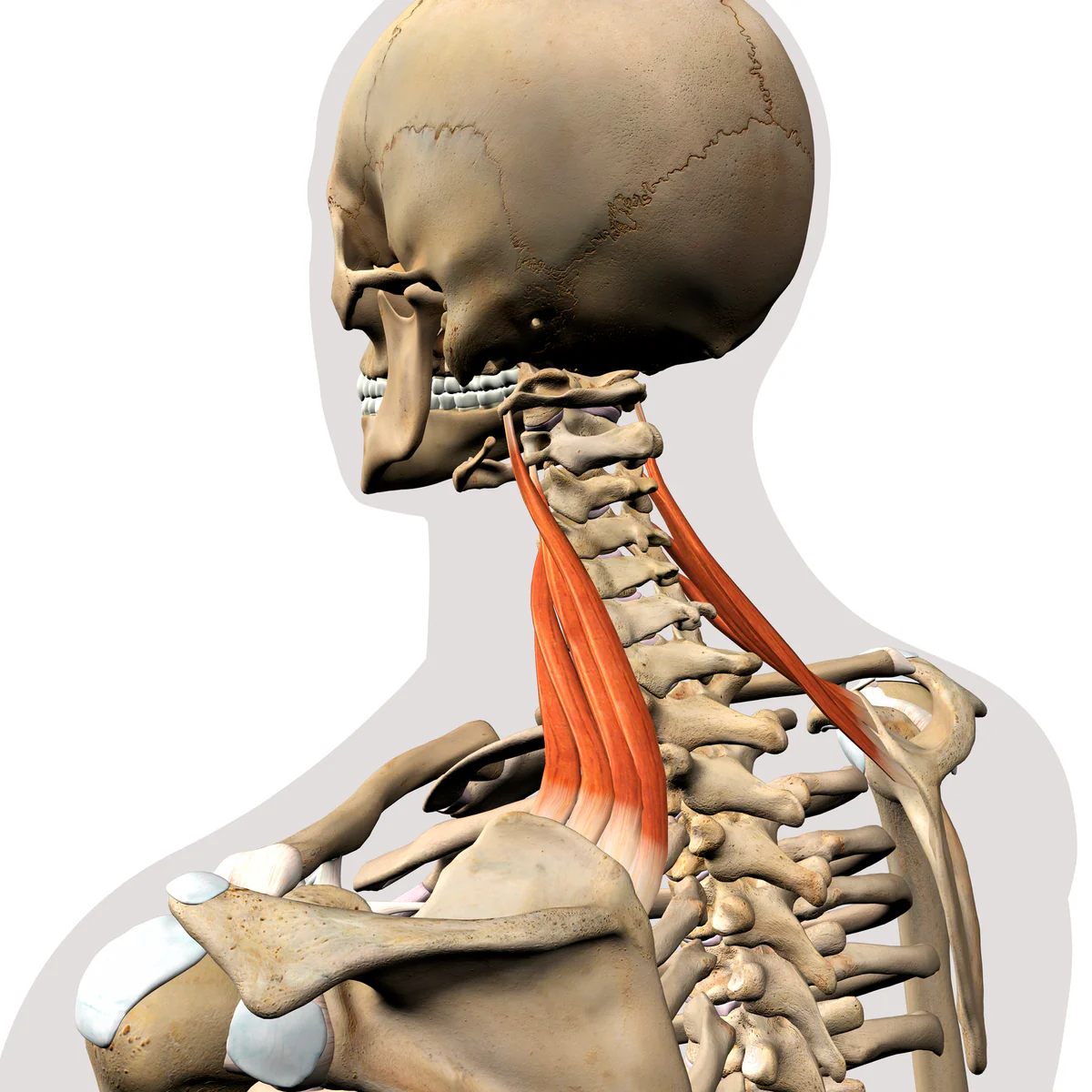
Spinal Accessory Nerve
Course: upper spinal cord (c1-c5 nerve root) → exit spine through foramen magnum→ jugular foramen→ internal carotid artery→ SCM → trapezius
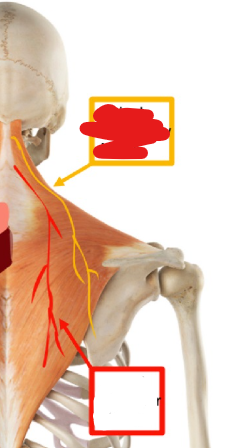
Latissimus dorsi muscle
Origin: spinous process of T7-T12 + L1-5 + sacrum, thoracolumbar fascia, posterior third of iliac crest, and the ribs 9-12
Insertions: intertubercular groove of humerus
Innervation: thoracodorsal nerve ← branch of posterior cord (C6-8)
Action: extend, abduct and medial rotation of arm at shoulder joint
lateral flexion of spine
down rotation, depression and abduction of scapula
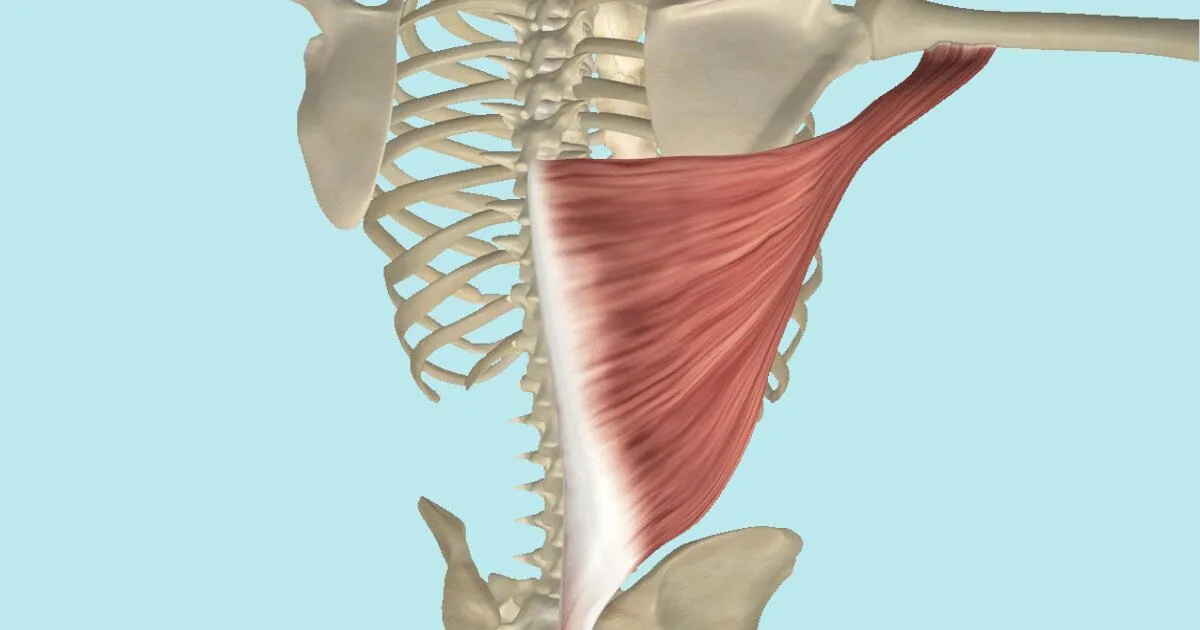
Rhomboid major
Origin: spinous process of t2-5
Insertions: medial border of scapula below scapular spine
Innervation dorsal scapular nerve (c5)
Action: abduct, down rotate, elevate and stabilize scapula
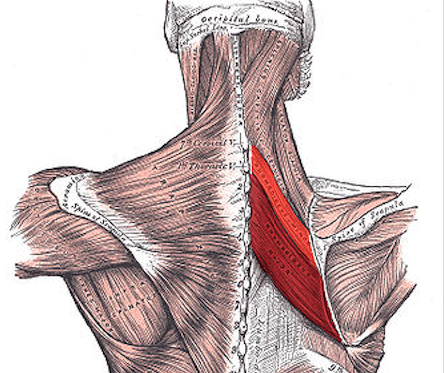
Rhomboid minor
Origin: spinous process C7 + T1
Insertions: medial border of scapula above scapular spine
Innervation: dorsal scapular nerve (c5)
Action: abduct, down rotate, elevate and stabilize scapula
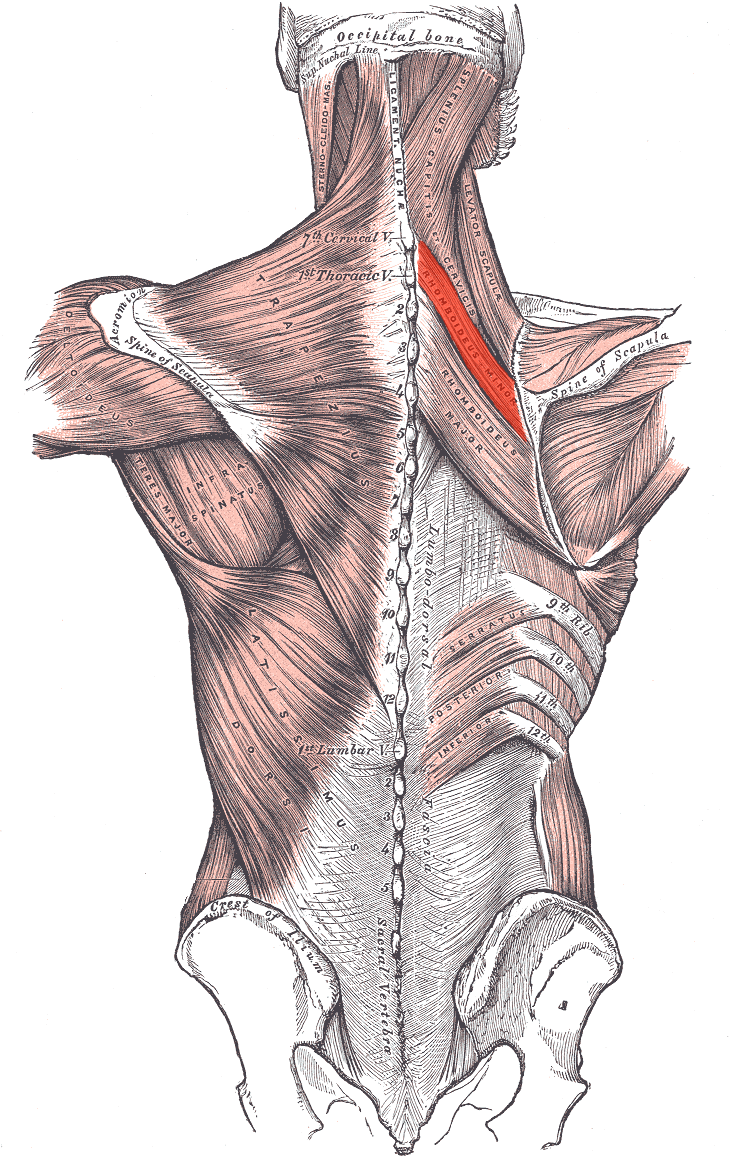
Posterior Deltoid
Origin: Scapular spine
Insertion: Deltoid tuberosity on the lateral side of the body of the humerus
Innervation: Axillary nerve (C05 and C06)
Action: Extension, horizontal abduction, and lateral (external) rotation of the arm at the shoulder joint
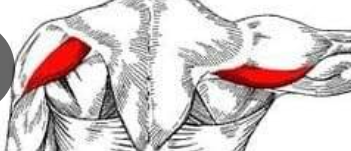
Serratus posterior superior
Origin: supraspinal ligament, ligamentum nuchae + spinous process of T1-T3 + C7
Insertions: upper border of rib 2-5
Innervation: intercostal nerve 2-5 (T1-5)
Action: elevate upper rib
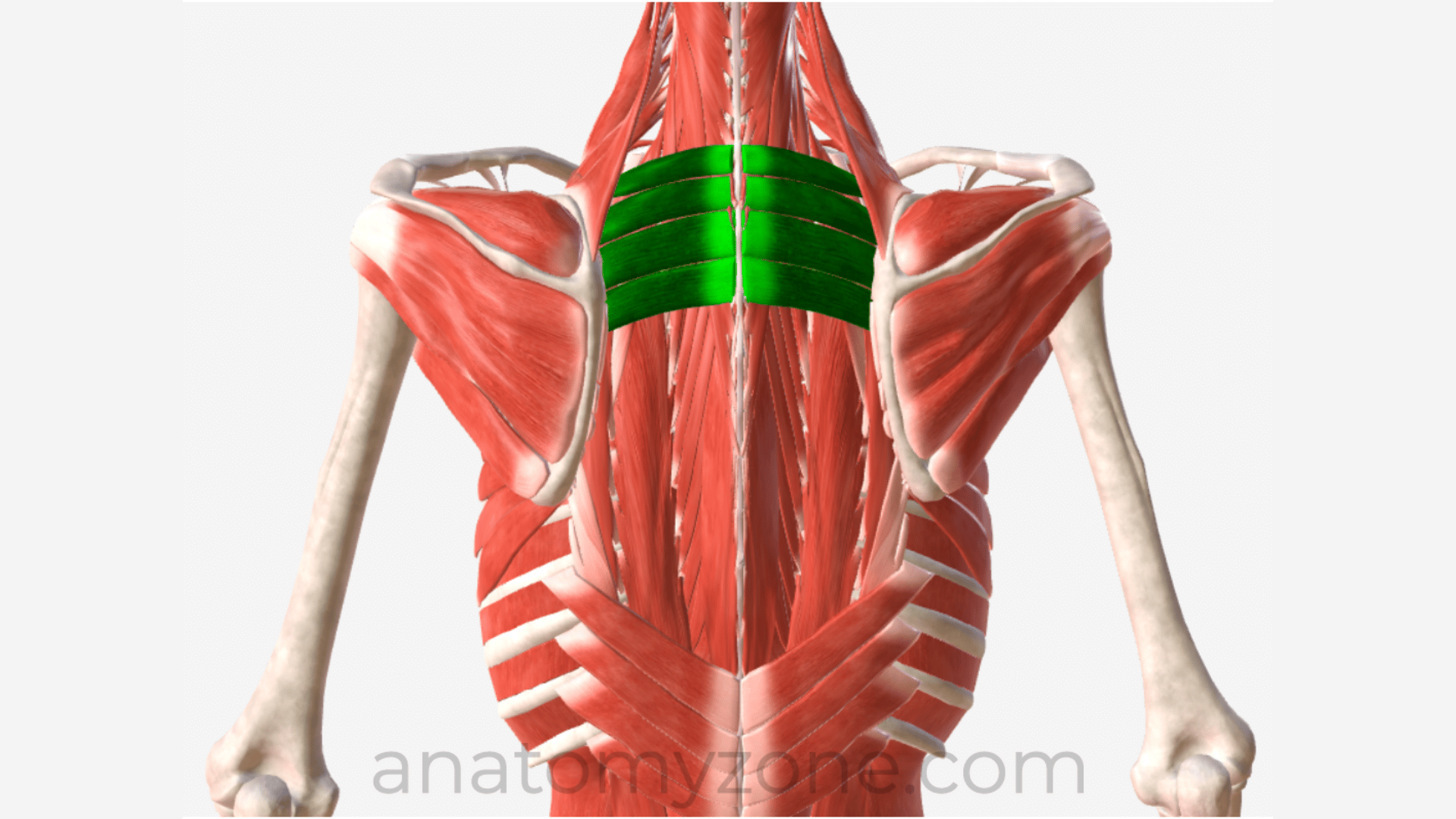
Serratus posterior inferior
Origin: supraspinous ligament + spinous process of T11-L3
Insertions: lower border of rib 9-12
Innervation: intercostal nerve 9-12 (T9-T12)
Action: deoression of ribs
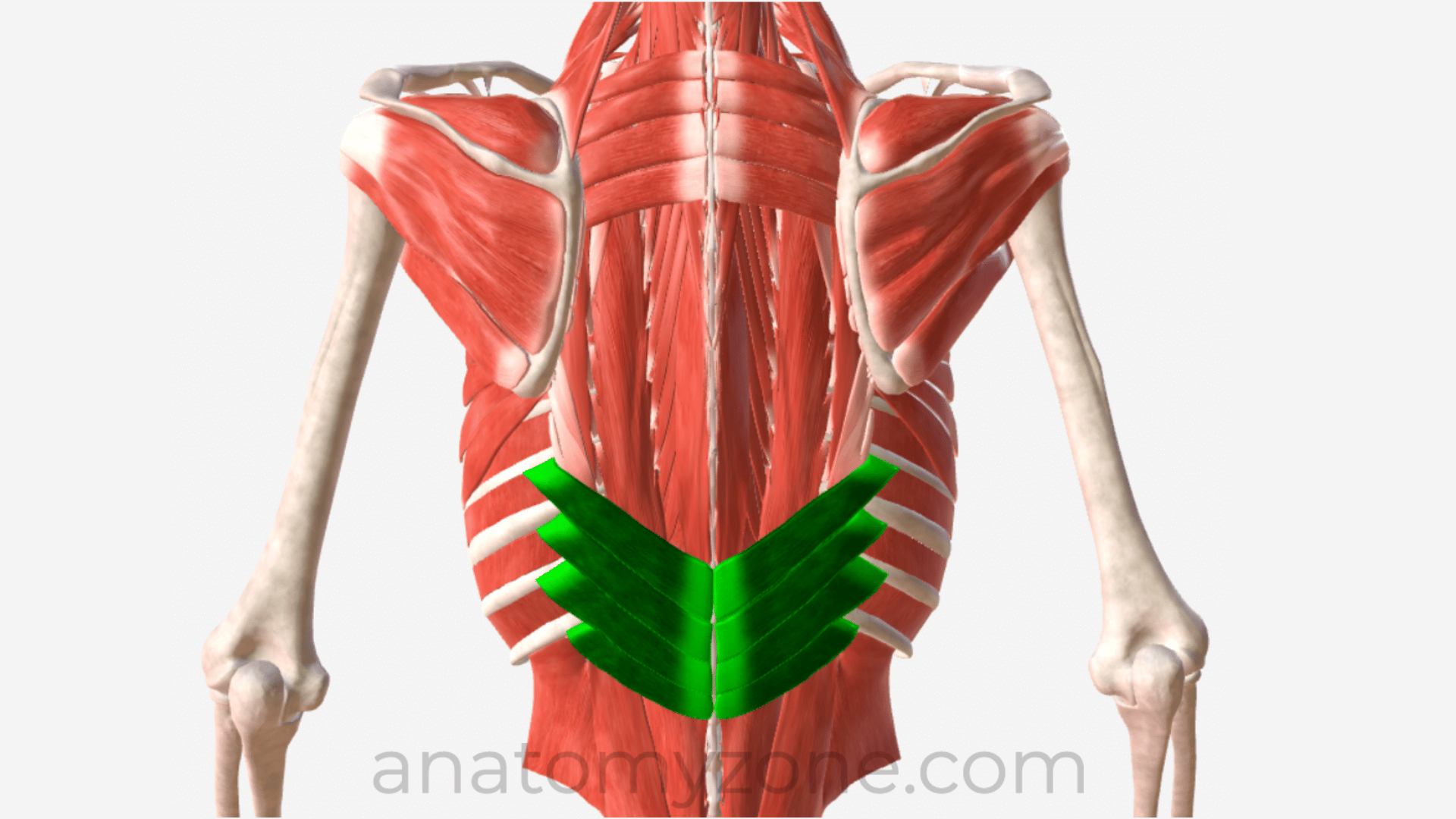
Semispinalis capitis
Origin: Tips of the transverse processes of the upper 6-7 thoracic vertebrae and vertebra C07 and from the articular processes of vertebrae C04-C06.
Insertion: Between the superior and inferior nuchal lines of the occipital bone
Innervation: Dorsal rami of the spinal nerves
Action: Extension of the spine; extension and lateral flexion of the neck
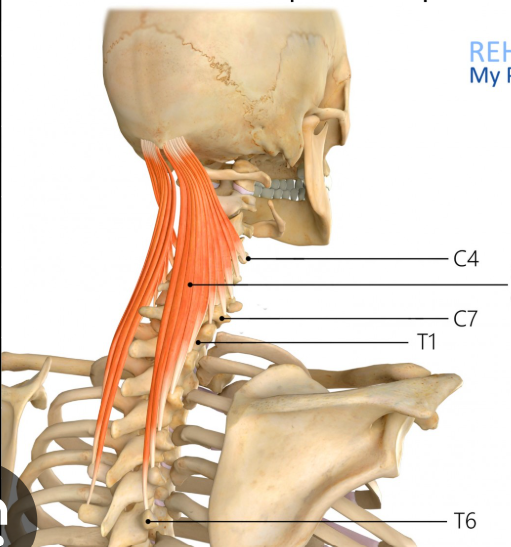
Semispinalis cervicis
Origin: Transverse processes of vertebrae T01-T06
Insertion: Spinous processes of vertebrae C02-C07
Innervation: Dorsal rami of the spinal nerves
Action: Extension of the neck and spine; contralateral rotation of the head
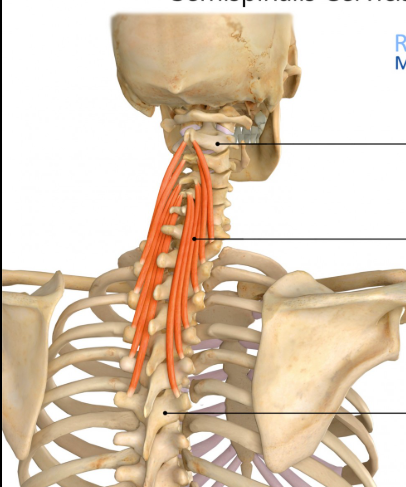
Semispinalis thoracis
Origin: Transverse processes of vertebrae T06-T12
Insertion: Spinous processes of vertebrae C06-T04
Innervation: Dorsal rami of the spinal nerves
Action: Extension of the spine
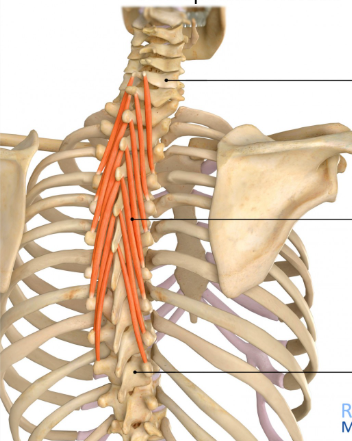
Splenius Capitis
Origin: Lower half of the ligamentum nuchae and spinous processes of vertebrae C07-T03
Insertion: Mastoid process of the temporal bone and the rough surface of the occipital bone
Innervation: Dorsal rami of the middle cervical nerves
Action: Extension and lateral flexion of the neck and spine; ipsilateral rotation of the head
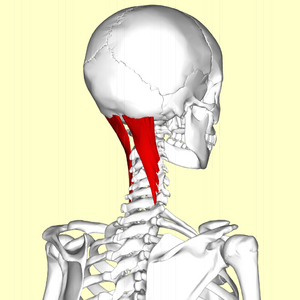
Splenius Cervicis
Origin: spinous process of T3-T6
Insertions: transverse process of c1-c3
Innervation: dorsal rami of nerve C1-C6
Action: extension/lateral flex of neck + spine
ipsilateral rotation of head (turn head towards side of body doing action)
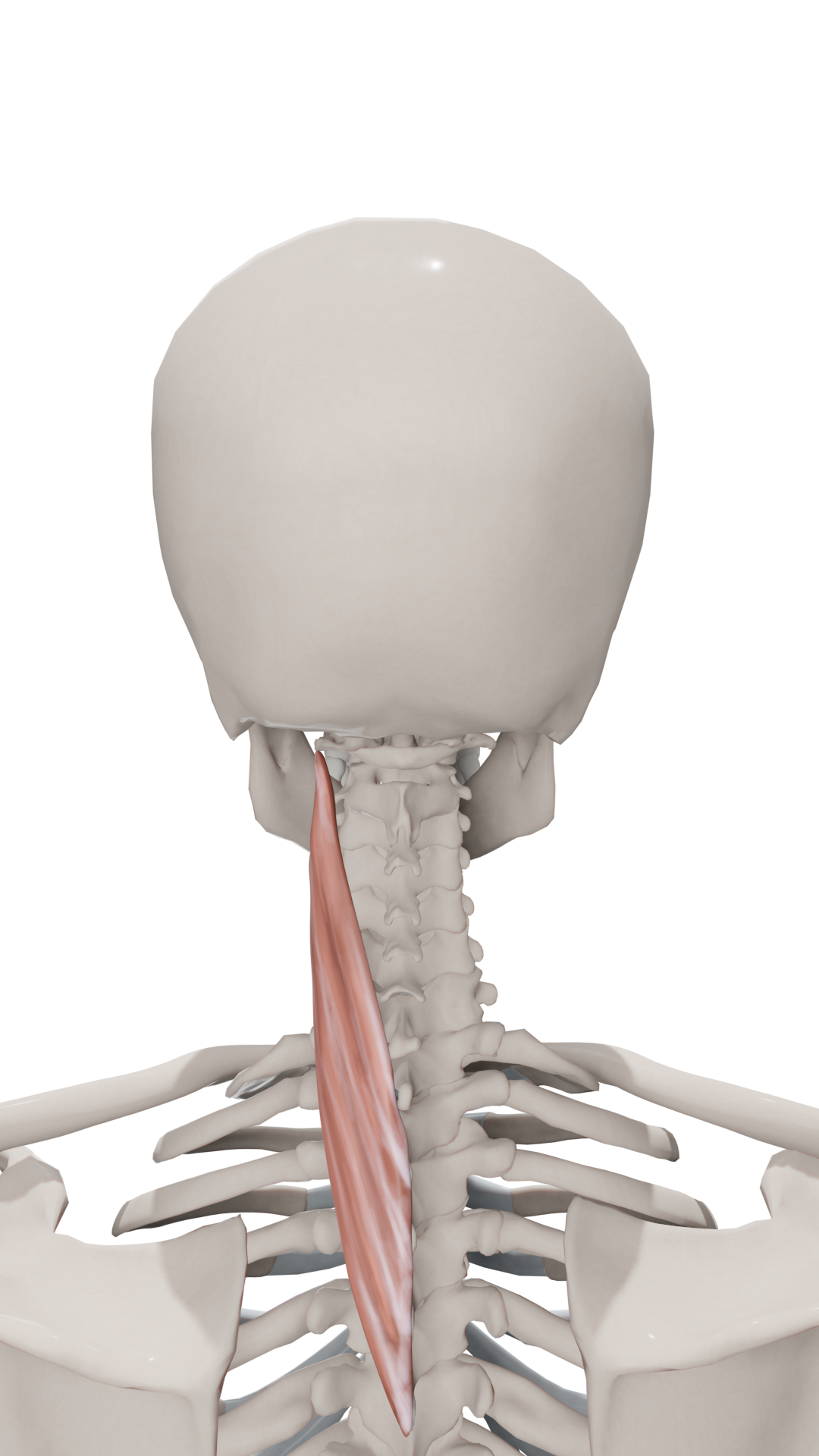
Erector Spinae
Longissimus, iliocostalis, and spinalis
Intermediate muscles
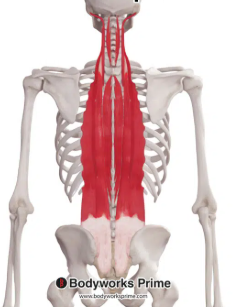
Iliocostalis cervicis
Origin: Ribs 3-6
Insertion: Transverse processes of vertebrae C04-C06
Innervation: Dorsal rami of the spinal nerves
Action: Extension and lateral flexion of the spine
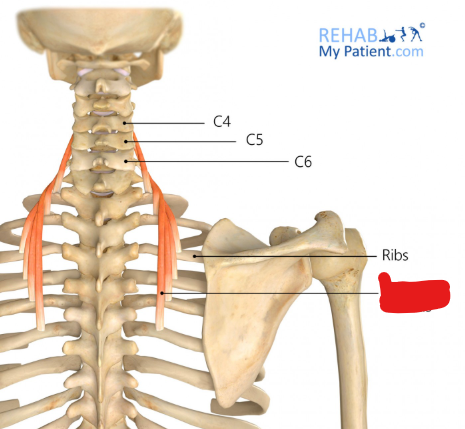
Iliocostalis thoracis
Origin: Upper borders of the angles of ribs 7-12, medial to the tendons of insertion of the lliocostalis lumborum
Insertion: Into the upper borders of the angles of ribs 1-6 and into the back of the transverse process of vertebra C07
Innervation: Dorsal primary rami of nerve C08 and the thoracic and upper lumbar nerves
Action: Extension and lateral flexion of the spine
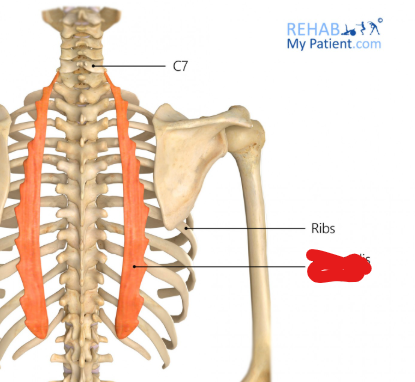
Iliocostalis lumborum
Origin: iliac crest + lateral portion of common erector spinae tendon
Insertions: inf. border of angles of lower 6-7 ribs
Innervation: dorsal rami of spinal nerves + thoracic/upper lumbar nerves
Action: extension + lat. flex of spine
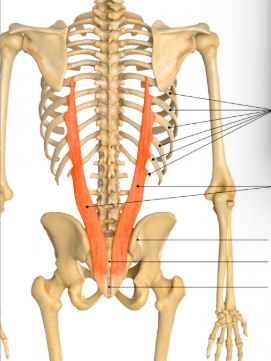
Longissimus capitis
Origin: Transverse processes of the upper 4-5 thoracic vertebrae and the articular processes of the lower 3-4 cervical vertebrae
Insertion: Posterior margin of the mastoid process, beneath the splenius capitis and sternocleidomastoid
Innervation: Dorsal primary rami of the middle and lower cervical nerves
Action: Extension and lateral flexion of the neck and spine; ipsilateral rotation of the head
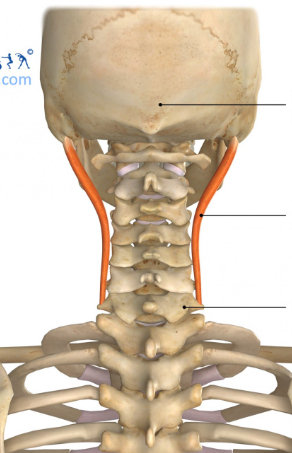
Longissimus cervicis
Origin: Transverse processes of vertebrae T01-T05
Insertion: Posterior tubercles of the transverse processes of vertebrae C02-C06
Innervation: Dorsal primary rami of the upper thoracic and lower cervical nerves
Action: Extension and lateral flexion of the neck and spine; ipsilateral rotation of the head
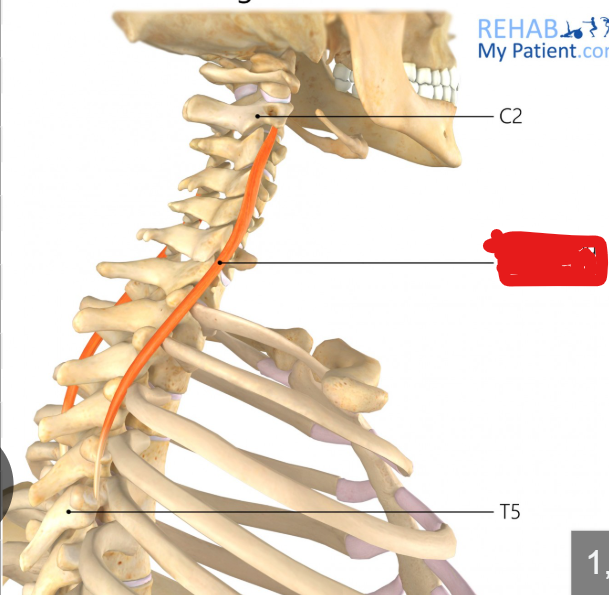
Longissimus thoracis
Origin: whole length of posterior surface of transverse process + accessor process of lumbar vertebrae/lumbodorsal fascia
Insertions: (by rounded tendons) into the tips of the transverse processes of all the thoracic vertebrae, and by fleshy processes, into the lower 9-10 ribs between their tubercles and angles
Innervation: Dorsal primary rami of the thoracic and lumbar nerves
Action: extension/lateral flex of spine
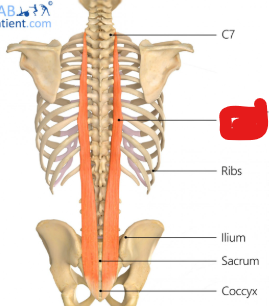
Spinalis thoracis
Origin: Spinous processes of vertebrae T11-L2
Insertions: Spinous processes of the upper thoracic vertebrae by 4-8 tendons
Innervation: Dorsal rami of the upper cervical nerves
Action: Extension and lateral flexion of the spine
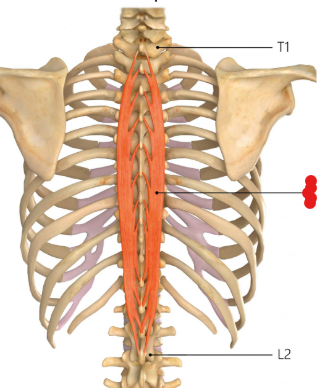
Rectus capitis major
Origin: Spinous process of the axis (C02)
Insertion: Lateral part of the inferior nuchal line of the occipital bone
Innervation: Posterior primary division of the spinal nerves (dorsal ramus of C01)
Action: Extension of the neck and spine; ipsilateral rotation of the head (turning the
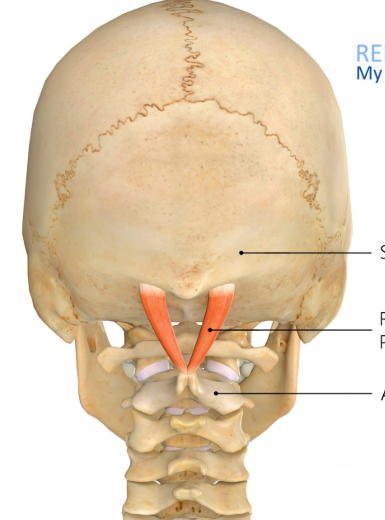
Rectus capitis minor
Origin: Tubercle on the posterior arch of the atlas (C01)
Insertion: Medial part of the inferior nuchal line of the occipital bone and the surface between it and the foramen magnum
Innervation: Branch of the dorsal primary division of the suboccipital nerve
Action: Extension of the neck and spine; now considered to be sensory in function
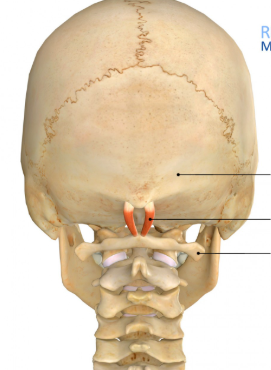
Obliquus capitis inferior
Origin: Apex of the spinous process of the axis (C02)
Insertion: Interior and dorsal part of the transverse process of the atlas (C01)
Innervation: Posterior primary division of the spinal nerves (suboccipital)
Action: Ipsilateral rotation of the head; extension and lateral flexion of spine + neck
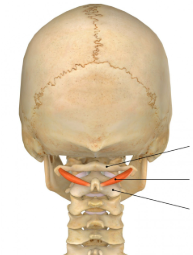
Obliquus capitis superior
Origin: Upper surface of the transverse process of the atlas (C01)
Insertion: Occipital bone between the superior and inferior nuchal lines
Innervation: Posterior primary division of the spinal nerves (suboccipital)
Action: Extension and lateral flexion of the neck and spine; ipsilateral rotation of the head
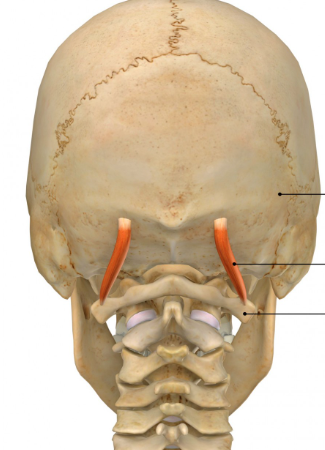
Suboccipital muscle
rectus capitis posterior major, rectus capitis posterior minor, obliquus capitis superior, and obliquus capitis inferior
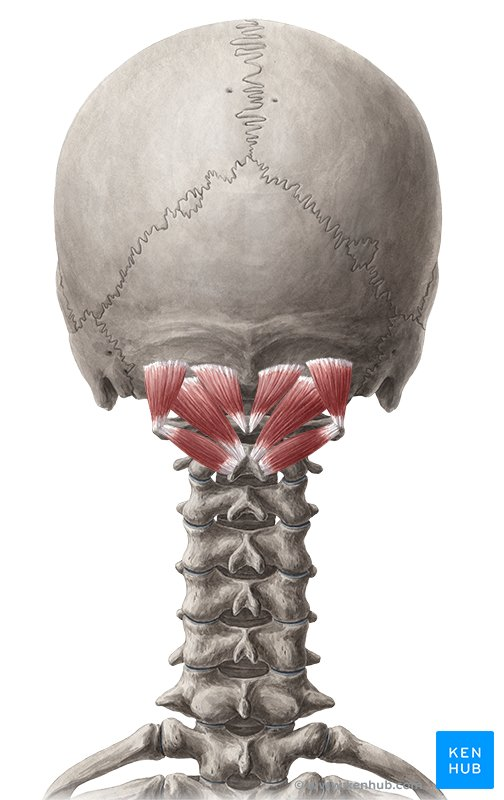
Multifidus
Origin: Sacrum, posterior superior iliac spine, mammillary processes of the lumbar vertebrae, transverse processes of the thoracic vertebrae, and articular processes of vertebrae C04-C07
Insertion: Spinous process of the vertebra 2-4 above the origin
Innervation: Posterior branches
Action: Stabilization of the vertebrae in local movements of the vertebral column; rotation of the thoracic spine; extension of the neck and spine; contralateral rotation of the head
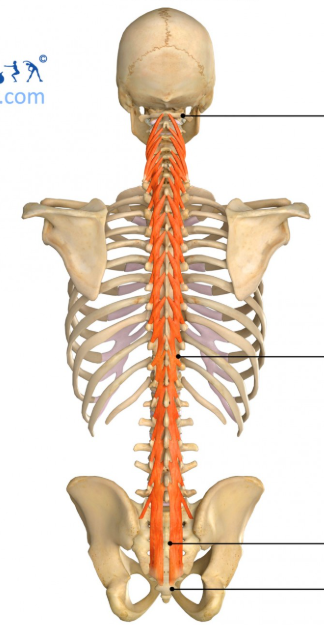
Rotatores brevis
Origin: Transverse process of each thoracic vertebra
Insertion: Spinous process of the vertebra above each origin
Innervation: Cervical, thoracic, and lumbar nerves (posterior branch)
Action: Rotation of the thoracic spine; extension of the spine; contralateral rotation of the head
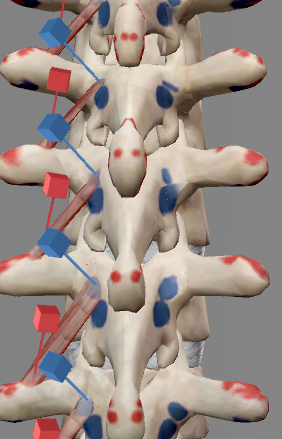
Rotatores longus
Origin: Transverse process of each thoracic vertebra
Insertion: Spinous process of the vertebra two above each origin
Innervation: Cervical, thoracic, and lumbar nerves (posterior branch)
Action: Rotation of the thoracic spine; extension of the spine; contralateral rotation of the head
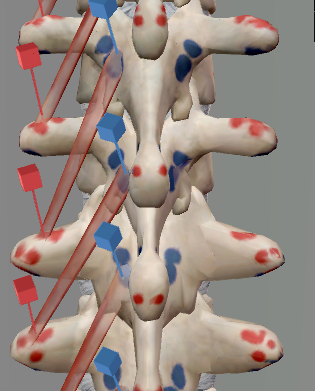
Interspinales
Origin: Spinous process of each vertebra
Insertion: Spinous process of the vertebra above each origin
Innervation: Cervical, thoracic, and lumbar nerves (posterior rami)
Action: Extension of the spine; interspinales cervicis assist in extension of the neck
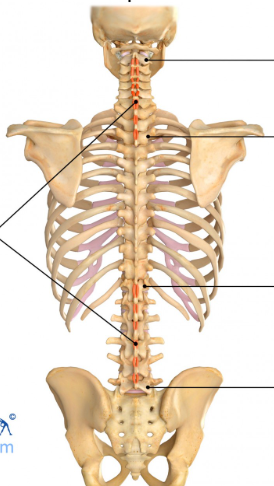
Intertransversarii
Origin: Transverse process of a vertebra
Insertion: Adjacent vertebra above each origin; the intertransversarii posteriores attach to the posterior tubercles of the transverse processes; the intertransversarii anteriores attach to the anterior tubercles of the transverse processes
Innervation: Cervical, thoracic, and lumbar nerves
Action: Lateral flexion of the spine; intertransversarii posteriores, anteriores, and mediales assist in lateral flexion of the neck
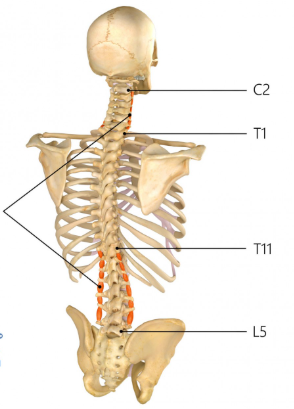
Levator costarum
Origin: Transverse processes of vertebrae C07-T11
Insertion: Outer surface of the rib immediately below the originating vertebra and, for the four lowest ones, the second rib below its origin
Innervation: Intercostal nerves (C08-T11)
Action: Lateral flexion of the spine; elevation of the ribs
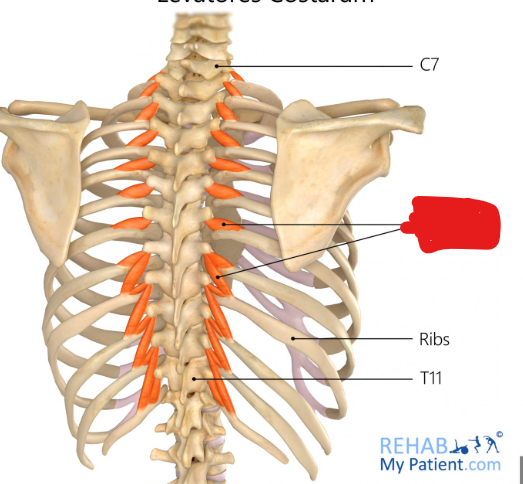
Quadratus lumborum
Origin: Aponeurotic fibers from the iliolumbar ligament and the adjacent portion of the iliac crest
Insertion: Lower border of the last rib for about half its length and the transverse processes of L01-L04
Innervation: Spinal nerves T12 and L01-L02
Action: Depresses the 12th rib, unilateralily raises pelvis, helps with lumbar spine lateral flexion, and acts as a major stabilizer of the lumb
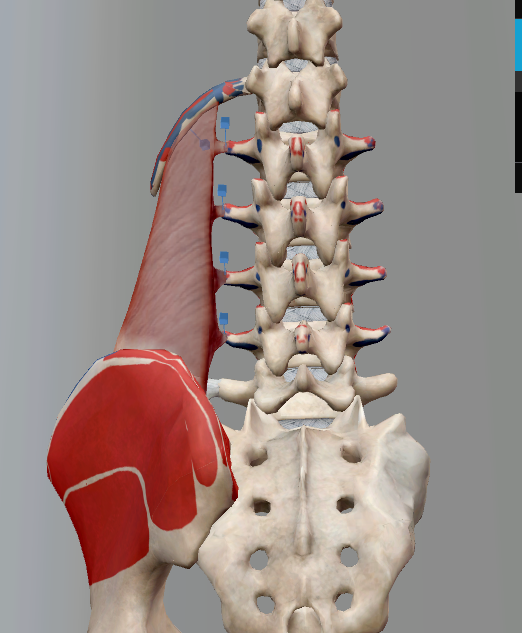
Psoas
Origin: (1) Transverse processes and bodies of all the lumbar vertebra; (2) intervertebral fibrocartilages (T12-L05); (3) a series of tendinous arches that extend across the constricted parts of the bodies of the lumbar vertebrae
Insertion: Lesser trochanter of the femur with the iliacus
Innervation: Branches from nerves L01-L04
Action: Flexion of the thigh at the hip joint; when the femur is fixed, flexes the trunk as in sitting up
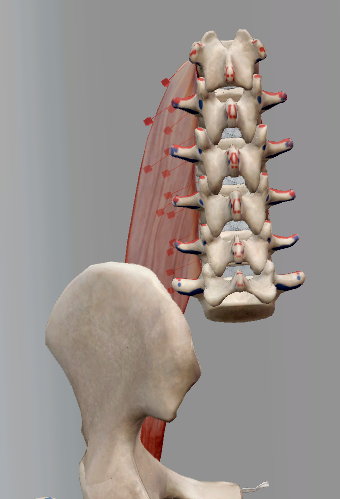
Vertebral Column
Total bones : 33
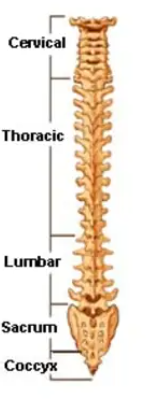
Cervical Vertebrae
Amount: 7
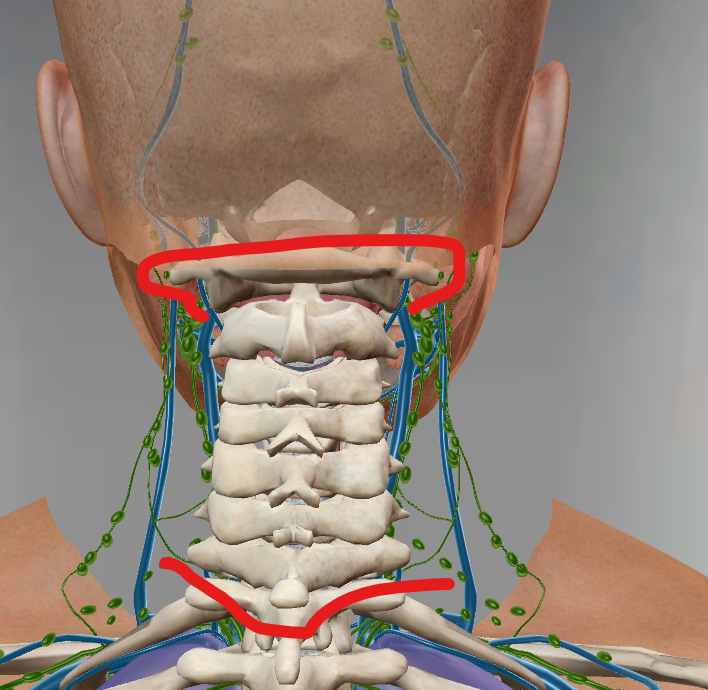
Atlas bone
C1
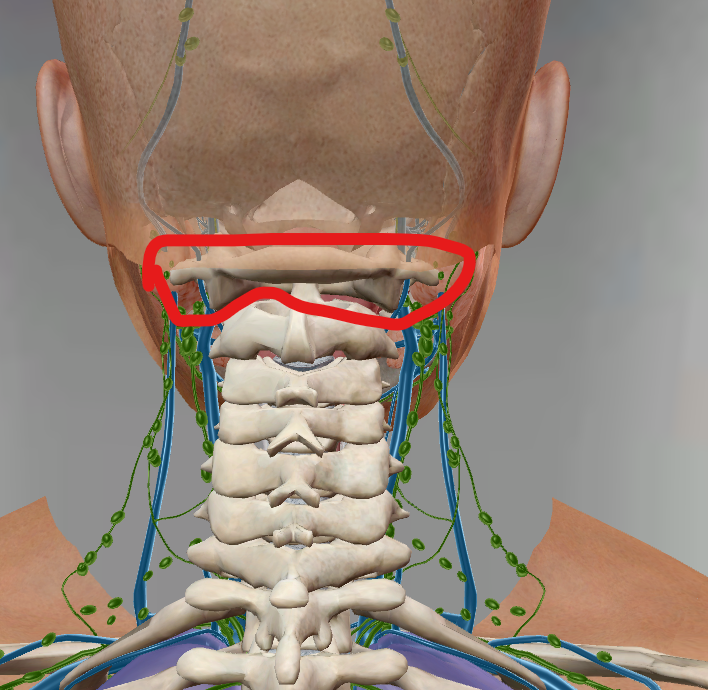
Axis bone
C2
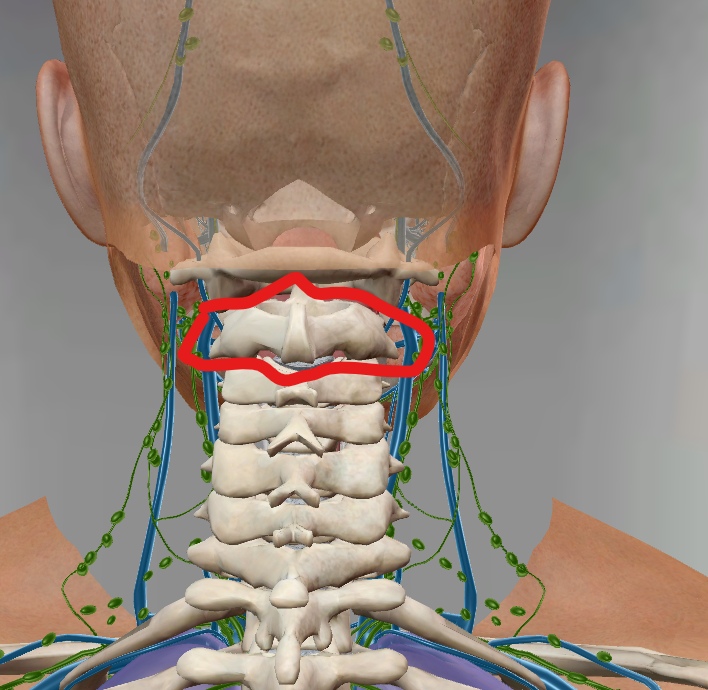
Thoracis Vertebrae
Amount: 12
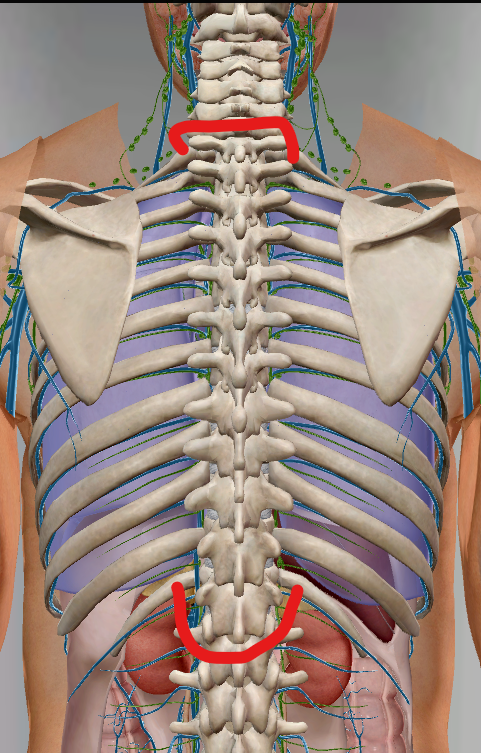
Lumbar Vertebrae
Amount: 5
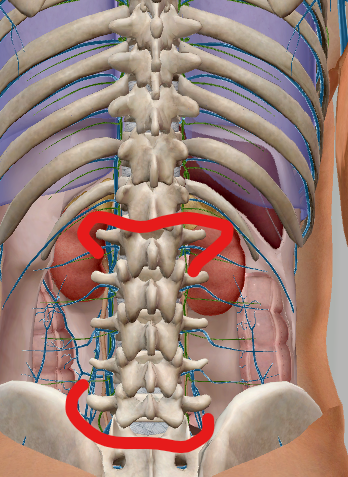
Sacrum Vertebrae
Amount: 5 fused
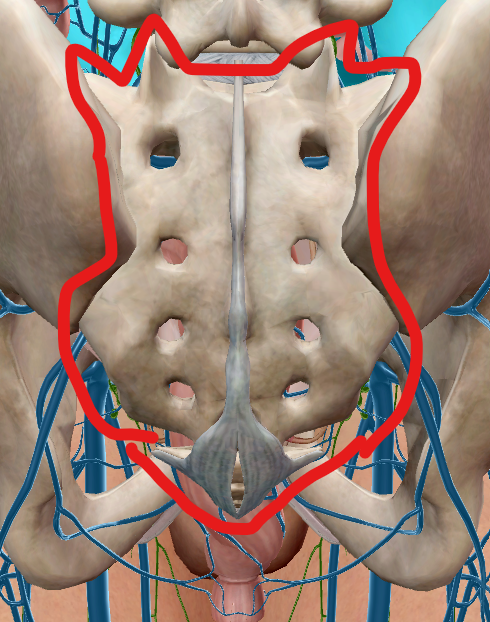
Coccyx Vertebrae
Amount: 4 fused
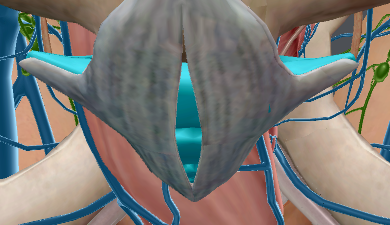
Spinous process
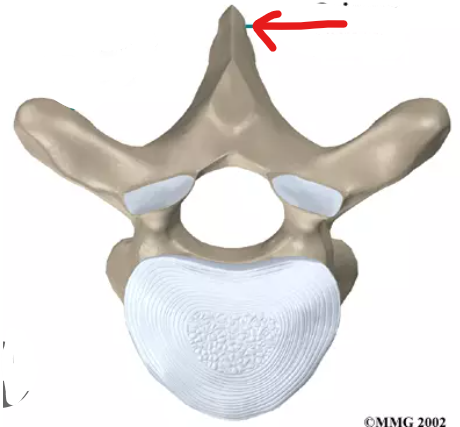
Transverse process
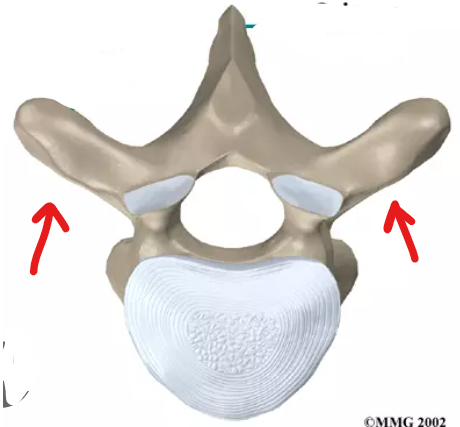
Transverse foramen (cervical only)
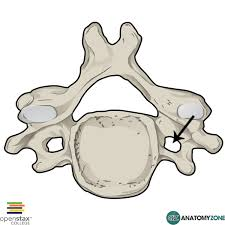
Lamina
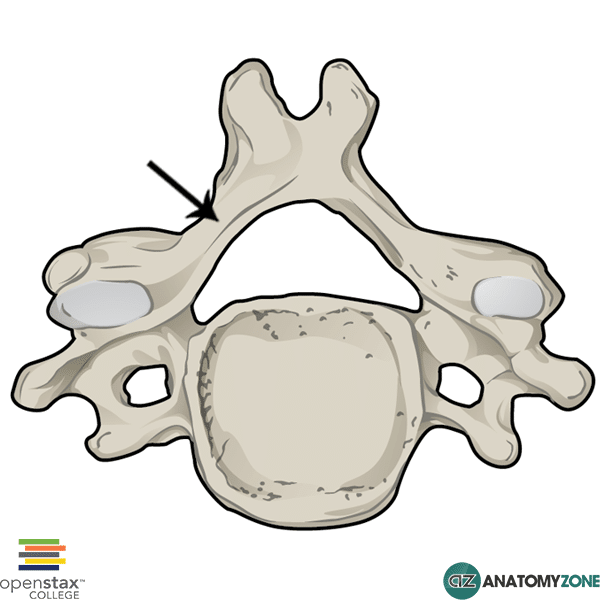
Pedicles
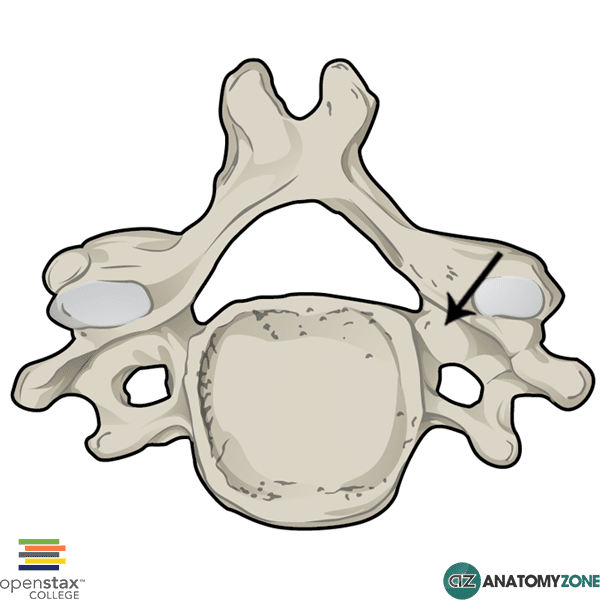
Vertebral body
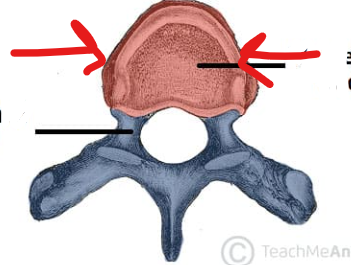
Superior articular process
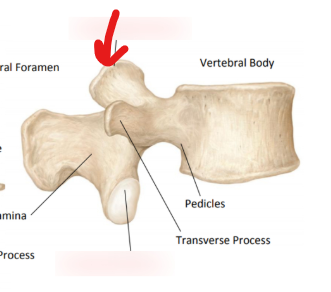
Inferior articular process
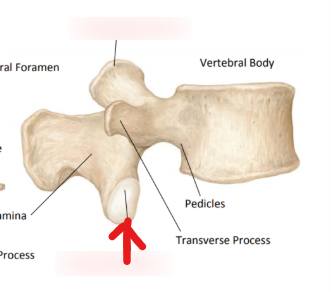
Vertebral foramen
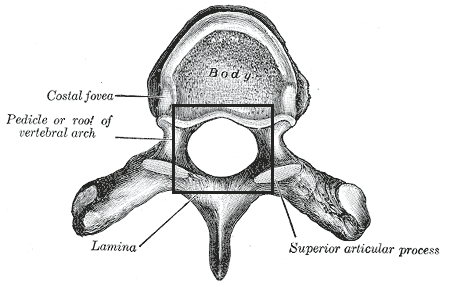
Intervertebral foramina (notches)
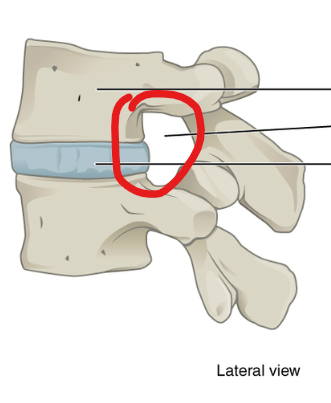
Intervertebral disc: nucleus pulposus
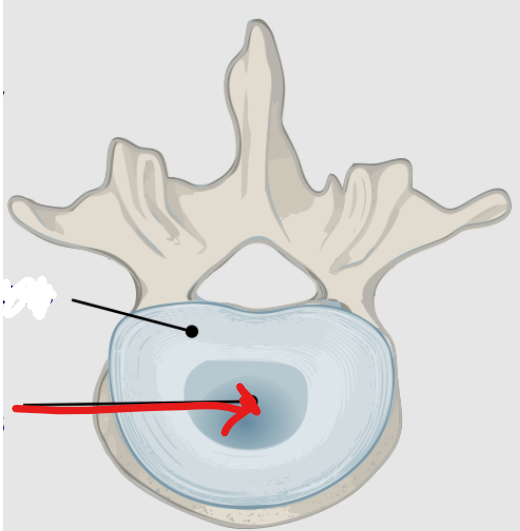
Intervertebral disc: anulus fibrosus
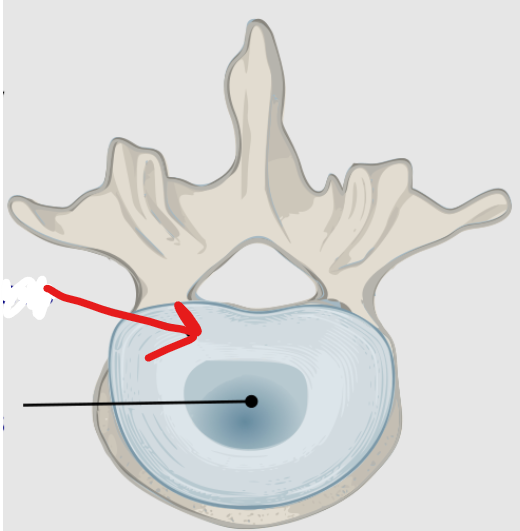
Ligamentum flavum
yellow, elastic ligament that connects the laminae of adjacent vertebrae in the spinal column
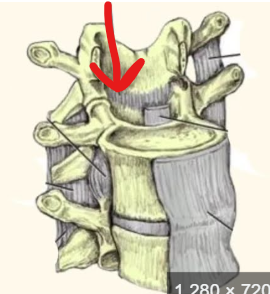
Denticulate ligament
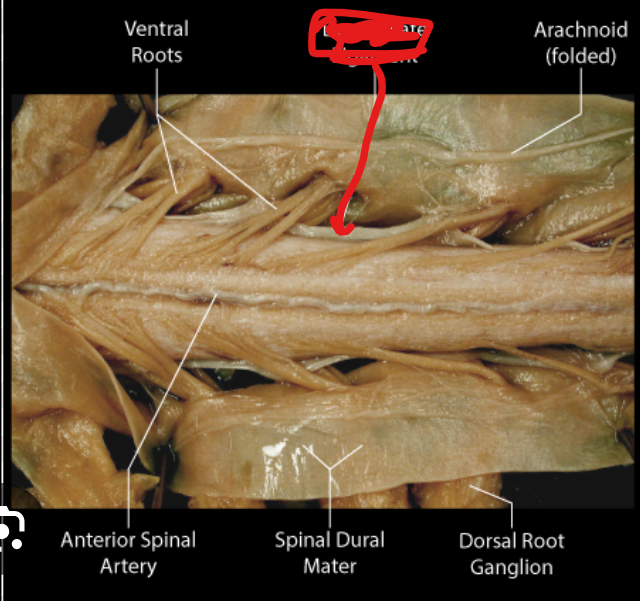
posterior longitudinal ligament
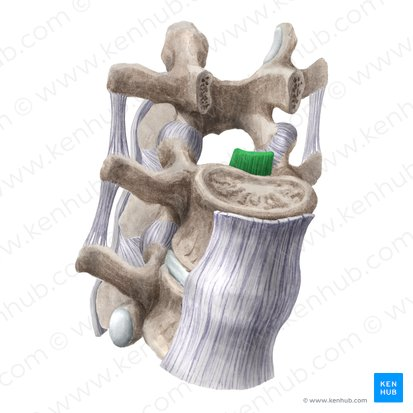
anterior longitudinal ligament
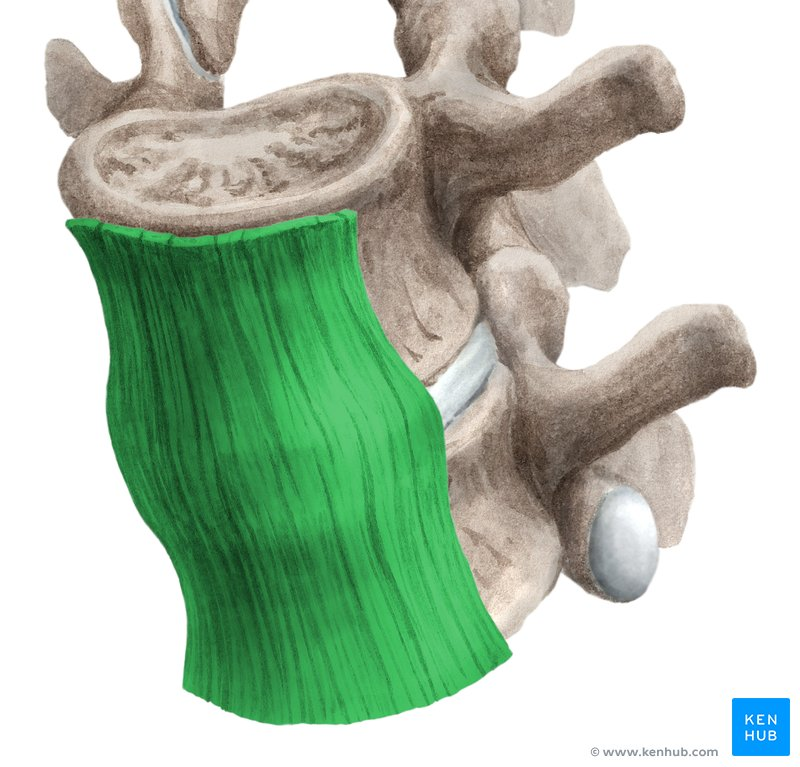
Meninges
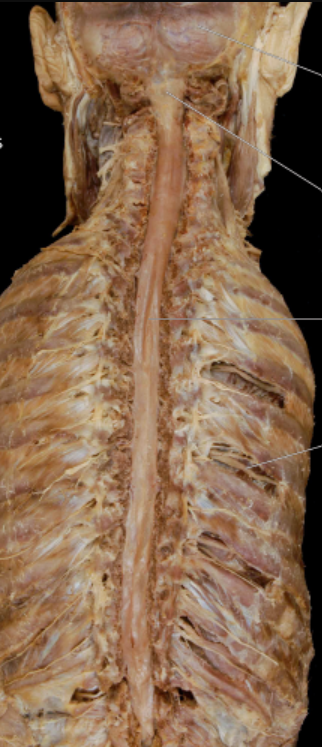
Filum terminale
thin, fibrous cord that extends from the conus medullaris to the coccyx.
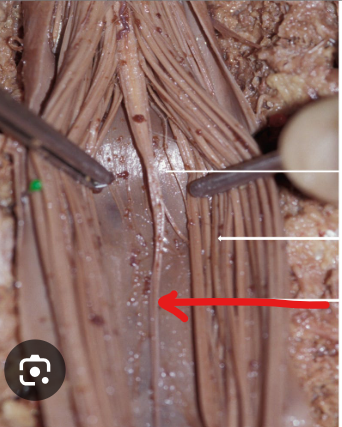
Posterior median sulcus
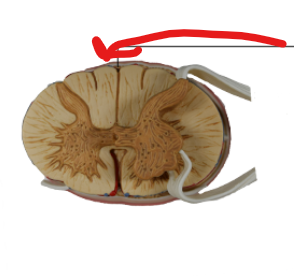
Cervical spinal enlargement
between shoulders (C3-T2)
section of the spinal cord in the neck region where the cord thickens to accommodate the large number of nerves controlling the upper limbs, forming the brachial plexus
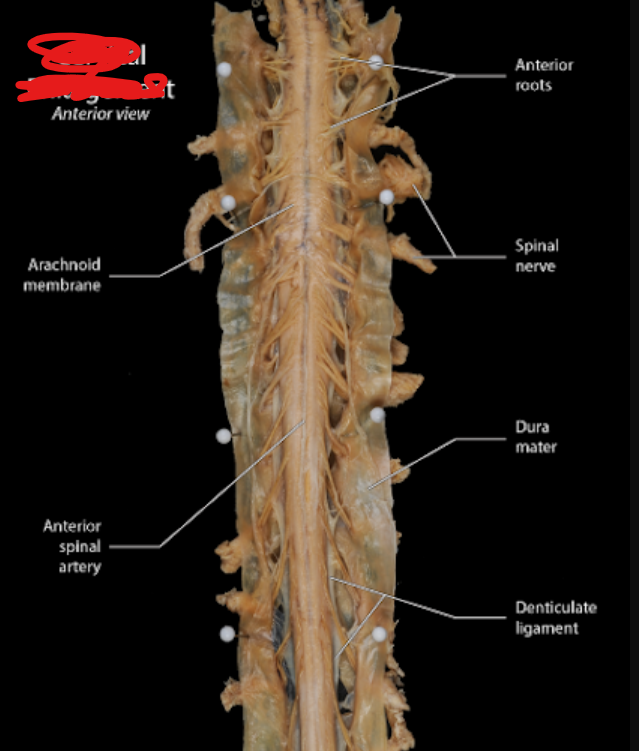
Lumbar spinal enlargement
lower back between L2-S3, above hips
widened spinal cord
Conus medullaris
the cone-shaped lower end of the spinal cord.
located at the level of the first or second lumbar vertebra (L1-L2)
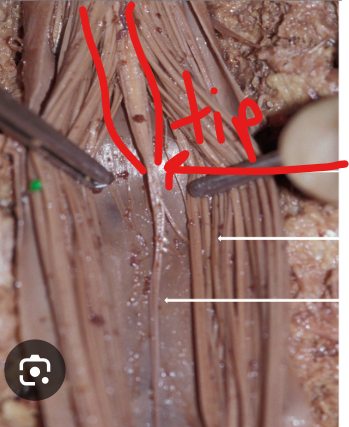
Cauda equina
fibers at L1 down
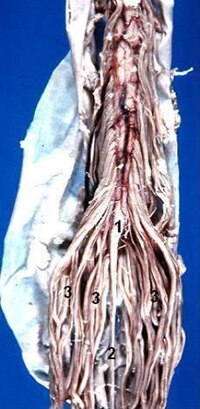
Anterior Root
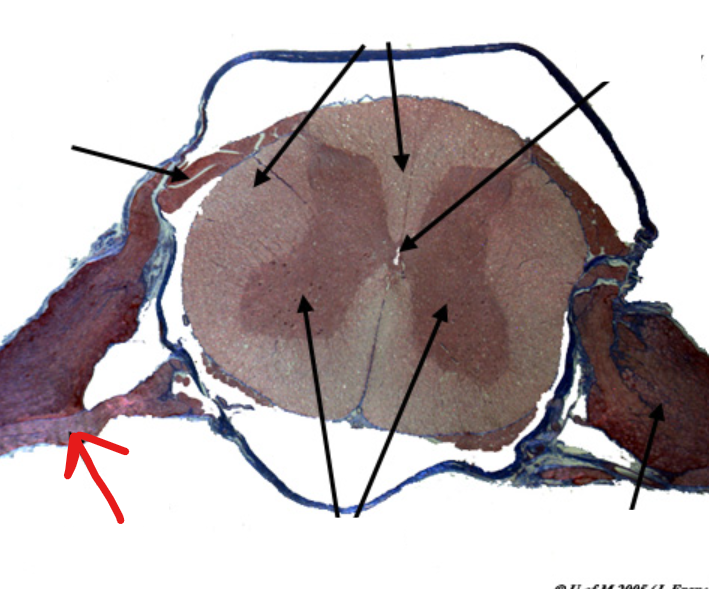
Posterior Root
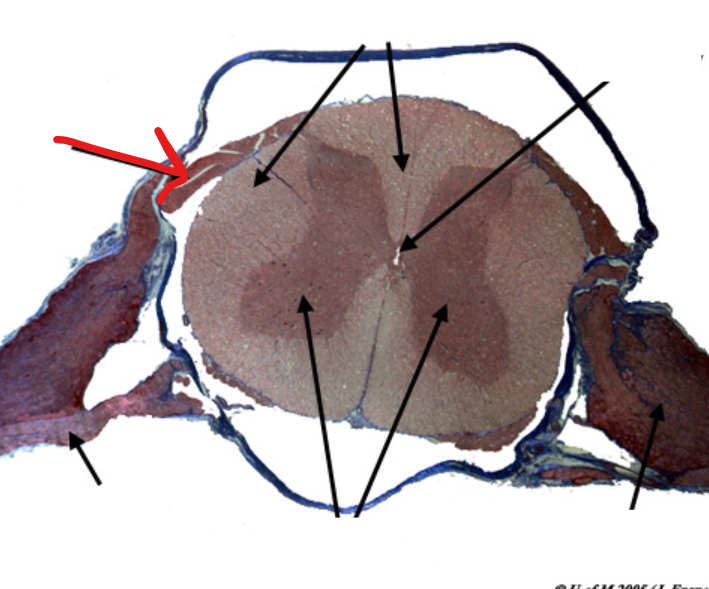
Dorsal Root Ganglia
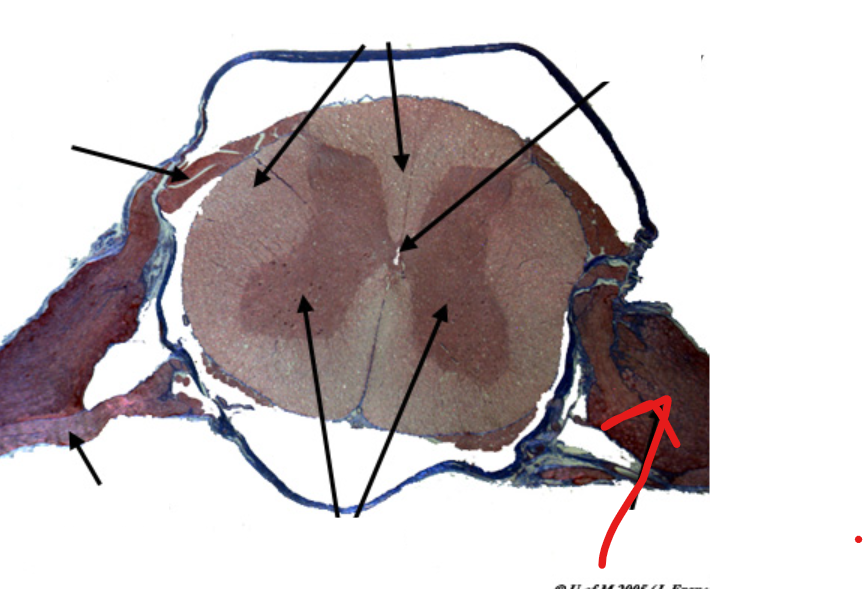
Anterior rami
‘primary nerve’
Posterior Rami
efferent nerve, up nerve
Scapula
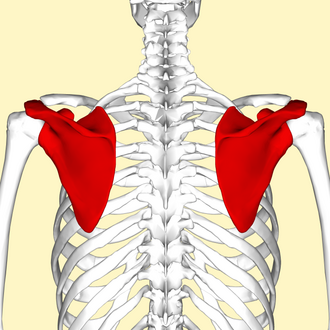
C7
most palpable point at base of neck
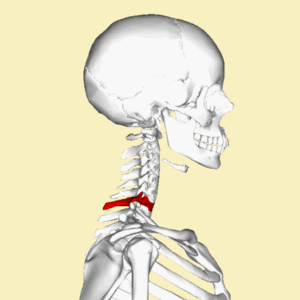
PSIL
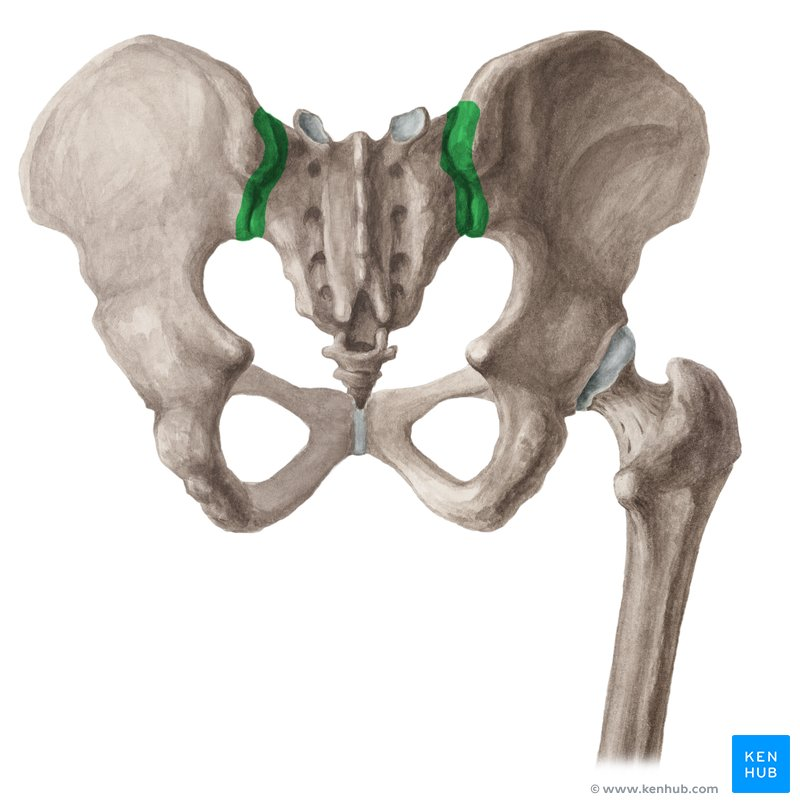
median furrow
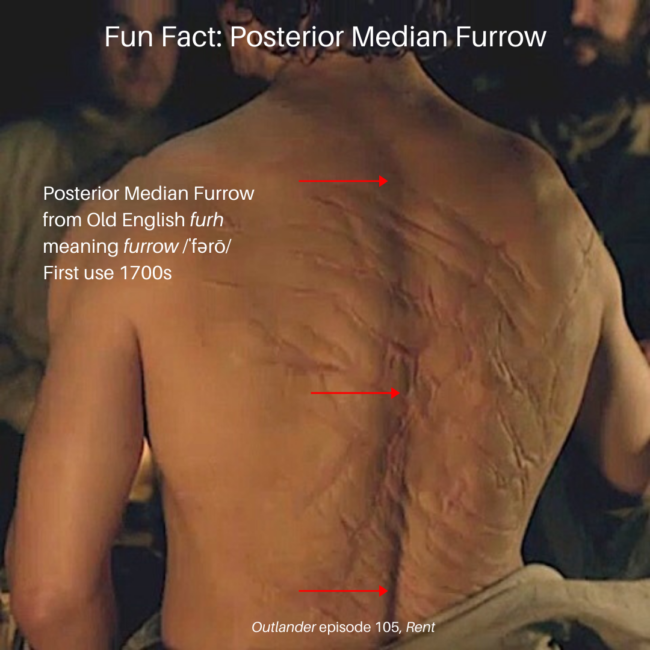
Triangle of auscultation
